
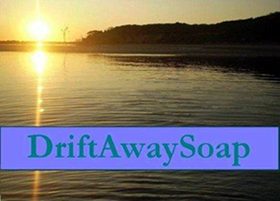
DriftAwaySoap: One woman’s clean alternative
by Chris Kardell
For nearly every product on the market today, there exists a so-called natural alternative.
It’s funny that we even need these safer, earth-friendly alternatives for everyday commodities that originally sprang from intuitive sources.
Today we seek out organic produce in order to avoid GMOs and pesticides, when once-upon-a-time, it went without saying that every tomato you saw was naturally organic.
The same goes with soap. Most of the stuff out there – body washes, facial cleansers, dish soaps, and even shampoos – are not really soap. They’re industrial detergents; modern copies of the age-old recipe for the true soap molecule.
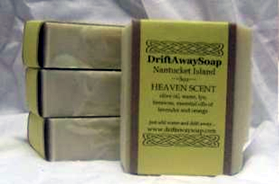
A few years ago, I developed an adverse skin reaction to some heavy-duty antibacterial dish soap. After it began, I couldn't come into contact with any dish soap, body wash, or shampoo without suffering another breakout.
I spent hours researching soap; its history, how it’s manufactured, and the industry it has become today.
By now, you may have heard the warnings about phthalates and sulfates, detergents that deteriorate into formaldehyde, and the damage these cleaners may do to marine life. How did it all begin?
Real soap (once-upon-a-time soap) dates back to the time of the Babylonians. It’s made with a simple recipe that uses only two ingredients: some kind of fat and an alkali (any substance with a high pH that dissolves in water) known as lye.
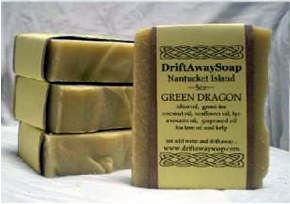
Every ancient civilization had its own variation on the basic recipe. Some used fat from animals and some used fat from vegetable oils.
They all obtained their lye from wood ashes (preferably hardwood ashes) steeped in water, or later on, water that had been filtered through the ashes.
The artistry and craftsmanship developed over the years, and by the sixth century A.D. a soap-makers guild was born in Naples.
In the 17th century, the Spanish kingdom of Castile became so famous for exporting their soaps made with olive oil that we still use the word "castile" today to connote an olive oil-based soap.
Hard bars of soap made with blends of various vegetable oils were popular in France and other parts of Europe throughout the following century.
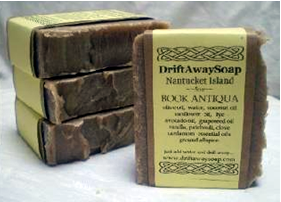
Given that soap was an extraordinary commodity that had sustained its purity for centuries, you may wonder why anyone wanted to mess with such a good thing. In the industrial era, new detergents and surfactants were developed that could degrease engines and lubricate factory equipment.
Next thing we know, this technology found its way into every mass-produced modern miracle designed to make housework a little easier, and eventually into our bath soaps.
These new detergents may arguably be efficient tools but our bodies don't need such harsh solutions. They dissolve grease so well that they not only wash away unwanted dirt but they make off with your skin’s natural healthy and moisturizing oils, as well as the good bacteria that protects you from the more harmful types.
The problem can get even more serious. Some people develop Multiple Chemical Sensitivities that cause debilitating symptoms when they’re confronted with artificial fragrances and other chemically engineered products.
There are studies tying this chemical overload to reproductive problems, mental health issues, and cancer, not to mention what happens to our planet as the chemicals decompose around us.
Over-exposure to these heavy-duty cleansers has subsequently created the need for a multi-billion dollar industry of additional chemical concoctions in the form of creams, moisturizers, and salves to replace some of what has been lost.
At this same point in time when I was immersed in this research, I was feeling the need to start contributing to my family's income. My husband is a hard-working carpenter and I’d been a stay-at-home mom of two awesome boys since 2001.
With absolutely no résumé or training, and one child still in preschool, I realized it was improbable that I might find employment of any substance. When you commit completely to motherhood, it is easy to let things slip by and lose sight of your personal goals.
Deep in the heart of the diaper days, I made a promise to myself that by the time I turned thirty I would master a new skill – something useful and valuable – and would thus become a more useful member of society.
 |
So last year, one year ahead of my goal, I turned my need and passionate obsession for safe and healthy traditional soap into a cottage industry.
I started DriftAwaySoap with my own recipes, inspired by centuries-old traditional craftsmanship. Without artificial colorants or fragrances or other unnecessary enhancements, I make soap by using vegetable oils, pure essential oils and natural beneficial ingredients.
One of the things that keeps me going is feeling that I provide a valuable service for those who buy my products. It’s hard to find “real” soap. I am constantly driven to explore new territory by listening to customers’ requests and suggestions.
Many products in my line are here because someone simply asked for them. I now offer toothbrushing soap, natural deodorants, and a shampoo bar line for all hair types, including a shampoo bar for dogs.
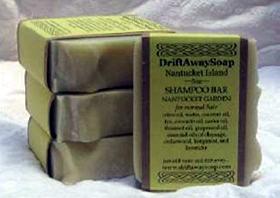
I’ve found it invaluable to spend time talking to people at craft shows and events, asking questions through social networks on the Internet and reading responses on my website.
Over the last year, I’ve developed a small yet wonderfully devoted fan base and am slowly but surely expanding my online sales.
DriftAwaySoap is my opportunity to share my product with other interested people and earn some income for my family, without having to leave my boys in someone else's care.
As I continue to expand my business, I find that I am not only not bored with the subject of soap, but increasingly empowered by my progress. I’m driven to learn more and do more every day.
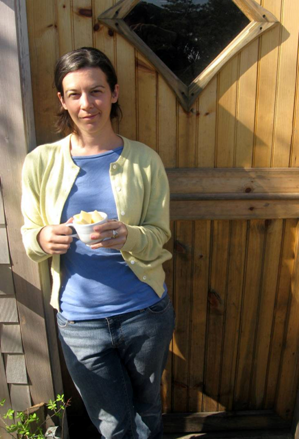
Chris Kardell lives with her family on Nantucket Island. For more information, visit her website at www.driftawaysoap.com --or read “Soap Box - the Blog” at www.driftawaysoap.wordpress.com